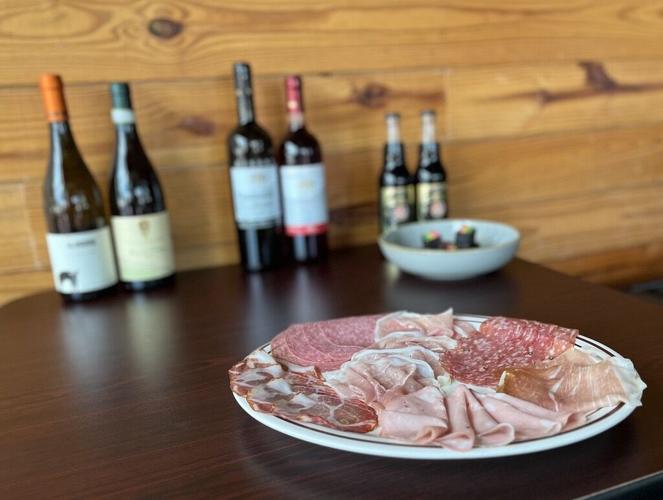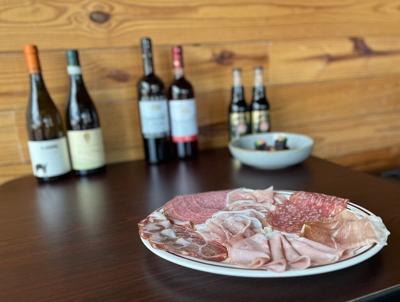Every three months, Joe Cardinale packs up his car and goes to visit his family in New York. But while he’s there, he stocks up on essentials — Calabrian chili peppers, cured meats and Manhattan Special Espresso Soda — for his Italian grocery store Alimentari Don Luigi and restaurant Enzo’s Italian Specialties.
“They’re just not available here at all,” said Cardinale. “In order to have that New York flavor, they have to get a taste of home.”
Across Soda City, there’s no shortage of restaurants that advertise their hyperlocal offerings, from farm-raised beef to backyard-grown herbs, but there are just as many restaurants that pride themselves on their out-of-state and international imports.
While many of these restaurant teams source produce locally, they argue their menus would not be the same without ingredients from outside the Palmetto State.
Case for outsourcing
Cardinale is not the only restaurant owner who is intent on outsourcing certain ingredients.
Marc Herro, owner of Pitas on Taylor Street, believes his imported Greek olives, along with his Middle Eastern tahini (sesame paste) and za’atar spice blends, are important to preserving the integrity of his Mediterranean recipes.
“You really want to be able to hit the correct, authentic flavors, and they must be imported over,” he said. “It’s definitely important to stay on the authentic side.”

Customers fill the dining area at Pita’s in Columbia on Wednesday, July 26, 2023. Henry Taylor/Staff
Cardinale believes his imported provisions, like limited-supply olive oil from a Portofino, Italy winemaker, make Don Luigi stand out.
“We absolutely want to have that,” he said. “That’s a really cool, unique thing that you’re not going to find anywhere else.”
But it’s not always a restaurant’s owner that motions for outsourcing.
Sean Kim, CEO of MOA Hospitality Group and owner of Main Street Korean restaurants MOA and the Vista’s 929 Kitchen, began thinking about importing ingredients from outside of South Carolina when his head chef, Roy Seo, who has cooked in kitchens across New York City’s Korea Town, began asking for products from international stores H Mart and Assi Plaza in Georgia.
“I showed him apple (cider) vinegar here, and he wasn’t happy,” Kim said. “He’s a typical, first-generation chef and he’s used the same brand for 30 years. He said it has to be the certain brand.”
For Seo it’s not always about sticking to what’s familiar — it’s about staying loyal to the flavors in a dish. Kim said, oftentimes, Seo has requested out-of-state imports when he has least expected it.
“It’s steamed rice. I can find Asian rice around Costco,” said Kim. “But typically, he wants to mix some premium sweet rice that makes your bowl of rice stickier and sweeter.”
Ultimately, Kim said he defers to Seo in most cases. As a result, MOA and 929 chefs continue to cook with an array of imported ingredients.
“Of course, I tried to convince him — I mean, it’s the same to me. Why is it so different?” Kim remembered asking. “He has more experience, so ... I don’t argue with him.”

Many of MOA's cooking ingredients, including (left to right) seaweed, perilla seed powder, sweet rice, cooking oil and apple cider vinegar, are Korean imports sourced from international grocery stores, like H Mart and Assi Plaza, in Georgia.
The import process
At Cayce’s Duke’s Pad Thai, a cup of hot and sour tom yum soup has a whopping 18 ingredients — from mushrooms and red peppers to lemongrass and lime leaves.
“We have to get all these products, just to get them into one soup,” said Noi Souvanna, the restaurant’s owner and operator, who also opened sister restaurant Little Bee Bun Mee last year. “People don’t realize how much work goes into it and how the food gets to your plate.”
When it comes to sourcing this extensive list of ingredients, Souvanna believes traveling across the country — including to New York, Chicago and Las Vegas — and tasting its culinary offerings are key aspects of the process.
“I’m always eating at different places and trying all different restaurants,” she said. “That is just where my heart goes.”
Pita’s Herro emphasized the importance of his travels when it comes to sourcing the perfect ingredients.
“I’m constantly traveling back to the Middle East area. I get to have new ideas there and to taste some different products,” Herro said. “We had to try a lot of different products and see which one worked best for us and which the customers wanted. That took a while.”
But Herro noted this process can take a while — and streamlining it can be an uphill battle.
“A lot of this business is trial and error. And, of course, there’s always complications,” he said. “We are now lucky to receive at least once-a-week shipments, but, back in the day, it had to be every three months.”
Cardinale is still working on making his sourcing process as cost-effective as possible. Because there is little-to-no demand in Columbia for some of his niche products, he said it can take “a lot of legwork” to get something in Don Luigi’s stock.
“Somebody had to make room in their warehouse for this, because it doesn’t exist here,” he said about many of his provisions. “It’s tough to stock a specialty store in town.”
How customers feel
Sometimes, MOA’s Kim wonders if the ends of this extensive sourcing process justify the means.
“Ninety percent of our customers are American,” said Kim. “I get really good compliments, but I think it’s not because of certain ingredients.”
But Herro argues his clientele appreciate Pita’s authentic menu items, and they are more excited than ever to try them.
“Everyone seems to want to be a little bold and brave, and to try different things,” said Herro. “They’re branching out a little bit and giving us a chance.”
Cardinale, like many of Columbia’s internationally skewed restaurateurs, recognized the challenges that come with sourcing these international ingredients — but between his desires to an untapped market and to introduce shoppers to the food from his childhood, he’s not planning on limiting himself to local ingredients anytime soon.
“Sometimes, people come in and they’re so happy when I recommend something they’ve never had before,” said Cardinale. “It’s really cool to turn people onto new stuff and get them to eat good and drink good. There’s nothing like that.”









